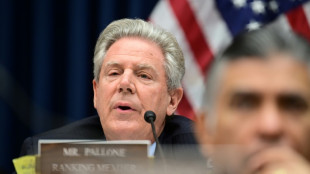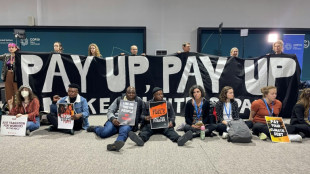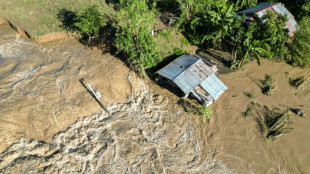
-
 Macron tells Xi he shares desire for 'durable peace' in Ukraine
Macron tells Xi he shares desire for 'durable peace' in Ukraine
-
Ruthless Japan beat China to move to brink of World Cup qualification

-
 French farmers threaten 'chaos' over proposed EU-Mercosur deal
French farmers threaten 'chaos' over proposed EU-Mercosur deal
-
Brazil arrests G20 guards over alleged 2022 Lula assassination plot

-
 China's Xi urges 'strategic' ties in talks with Germany's Scholz
China's Xi urges 'strategic' ties in talks with Germany's Scholz
-
Raducanu gives Britain lead on Slovakia in BJK Cup semis

-
 Russia says Ukraine fired first US-long range missiles
Russia says Ukraine fired first US-long range missiles
-
COP29 negotiators strive for deal after G20 'marching orders'

-
 Walmart lifts full-year forecast after strong Q3
Walmart lifts full-year forecast after strong Q3
-
British farmers protest in London over inheritance tax change

-
 NATO holds large Arctic exercises in Russia's backyard
NATO holds large Arctic exercises in Russia's backyard
-
Trouble brews in India's Manipur state

-
 Son of Norwegian princess arrested on suspicion of rape
Son of Norwegian princess arrested on suspicion of rape
-
Romanian court says 'irregularities' in influencer Andrew Tate's indictment

-
 Iran faces fresh censure over lack of cooperation at UN nuclear meeting
Iran faces fresh censure over lack of cooperation at UN nuclear meeting
-
Despondency and defiance as 45 Hong Kong campaigners jailed

-
 Scholar, lawmakers and journalist among Hong Kongers jailed
Scholar, lawmakers and journalist among Hong Kongers jailed
-
European stocks slide on fears of Russia-Ukraine escalation

-
 Police break up Georgia vote protest as president mounts court challenge
Police break up Georgia vote protest as president mounts court challenge
-
Spain royals visit flood epicentre after chaotic trip

-
 France's Gisele Pelicot says 'macho' society must change attitude on rape
France's Gisele Pelicot says 'macho' society must change attitude on rape
-
G20 leaders talk climate, wars -- and brace for Trump's return

-
 US lawmaker accuses Azerbaijan in near 'assault' at COP29
US lawmaker accuses Azerbaijan in near 'assault' at COP29
-
Tuchel's England have 'tools' to win World Cup, says Carsley

-
 Federer hails 'historic' Nadal ahead of imminent retirement
Federer hails 'historic' Nadal ahead of imminent retirement
-
Ukraine vows no surrender, Kremlin issues nuke threat on 1,000th day of war

-
 Novo Nordisk's obesity drug Wegovy goes on sale in China
Novo Nordisk's obesity drug Wegovy goes on sale in China
-
Spain royals to visit flood epicentre after chaotic trip: media

-
 French farmers step up protests against EU-Mercosur deal
French farmers step up protests against EU-Mercosur deal
-
Rose says Europe Ryder Cup stars play 'for the badge' not money

-
 Negotiators seek to break COP29 impasse after G20 'marching orders'
Negotiators seek to break COP29 impasse after G20 'marching orders'
-
Burst dike leaves Filipino farmers under water

-
 Markets rally after US bounce as Nvidia comes into focus
Markets rally after US bounce as Nvidia comes into focus
-
Crisis-hit Thyssenkrupp books another hefty annual loss

-
 US envoy in Lebanon for talks on halting Israel-Hezbollah war
US envoy in Lebanon for talks on halting Israel-Hezbollah war
-
India to send 5,000 extra troops to quell Manipur unrest

-
 Sex, drugs and gritty reality on Prague's underworld tours
Sex, drugs and gritty reality on Prague's underworld tours
-
Farmers descend on London to overturn inheritance tax change

-
 Clippers upset Warriors, Lillard saves Bucks
Clippers upset Warriors, Lillard saves Bucks
-
Acquitted 'Hong Kong 47' defendant sees freedom as responsibility

-
 Floods strike thousands of houses in northern Philippines
Floods strike thousands of houses in northern Philippines
-
Illegal farm fires fuel Indian capital's smog misery

-
 SpaceX set for Starship's next flight, Trump expected to attend
SpaceX set for Starship's next flight, Trump expected to attend
-
Texans cruise as Cowboys crisis deepens

-
 Do the Donald! Trump dance takes US sport by storm
Do the Donald! Trump dance takes US sport by storm
-
Home hero Cameron Smith desperate for first win of 2024 at Australian PGA

-
 Team Trump assails Biden decision on missiles for Ukraine
Team Trump assails Biden decision on missiles for Ukraine
-
Hong Kong court jails 45 democracy campaigners on subversion charges

-
 Several children injured in car crash at central China school
Several children injured in car crash at central China school
-
Urban mosquito sparks malaria surge in East Africa


Five weeks of war in Ukraine: from invasion to 'meaningful' talks
Russia invaded Ukraine in the early hours of February 24, setting off the worst conflict in Europe in decades.
We look back on five weeks of fighting that has killed thousands of civilians, sent four million people fleeing abroad and forced Russia to review its ambitions in the face of fierce Ukrainian resistance.
- February 24: Russia invades -
Russian President Vladimir Putin announces a "special military operation" to "demilitarise" and "de-nazify" the former Soviet state and protect Russian speakers in the country. He warns the international community against intervening.
A full-scale invasion starts with air and missile strikes on several cities. Ukrainian President Volodymyr Zelensky pledges to stay in Kyiv to lead the resistance.
- February 26: Stinging sanctions -
The West weighs in with unprecedented sanctions against Russia and military aid for Ukraine.
A number of Russian banks are banished from the SWIFT interbank system.
Air spaces are closed to Russian aircraft and Russia is kicked out of sporting and cultural events.
- February 27: Nuclear threat -
With his troops quickly getting bogged down, Putin puts Russia's nuclear forces on high alert, citing "aggressive" statements by NATO members and the financial sanctions.
- February 28: First talks -
During the first peace talks between Kyiv and Moscow, Russia sets out its demands, including the recognition of Russian sovereignty over Crimea, the "demilitarisation" and "de-nazification" of Ukraine and the guarantee of its neutrality.
Zelensky appeals for "immediate" EU membership, eliciting a cool response from Brussels.
- March 3: Kherson falls -
Russian troops gain ground in the south, where they lay siege to the strategic port of Mariupol, in a bid to link up territory held by pro-Russian rebels with the Russian-annexed peninsula of Crimea.
On March 3, the southern city of Kherson becomes to first city to fall.
- March 4: Media crackdown -
Russia enacts a new law punishing "fake news" about what it terms its "special military operation" in Ukraine with jail terms of up to 15 years.
NATO rejects Kyiv's pleas for a no-fly zone over Ukraine.
- March 8: First evacuations -
On March 8, the first humanitarian corridors are set up, allowing thousands of civilians to escape the northeastern city of Sumy and suburbs of Kyiv. Relief comes later to other regions.
- March 8: Oil embargo -
In a bid to starve Moscow of funds for the war, US President Joe Biden announces a ban on US imports of Russian oil and gas.
- March 13: Strikes near Poland -
The war nears the border with NATO member Poland when 35 people are killed and more than 130 injured in air strikes on a military training ground outside Lviv.
- March 16: Zelensky lobbies Congress -
Zelensky tells the US Congress to "remember Pearl Harbor" as he lobbies one Western parliament after another for more assistance in repelling Russia's attacks. A day later he warns Germany that Russia is building a new "wall" in Europe between "freedom and bondage."
- March 17: 'War criminal' Putin -
Biden brands Putin a "war criminal" following the bombing of a theatre in the besieged city of Mariupol where families were sheltering.
- March 18: Hypersonic weapons -
Russia says it has used hypersonic missiles for the first time in Ukraine to destroy a weapons storage site.
- March 24: Chemical, nuclear protection -
NATO says it will help Ukraine protect its forces against the threat of chemical and nuclear attack following warnings from the US that Putin could be planning to use chemical weapons and a warning from the Kremlin that he could use nuclear arms in the event of an "existential threat" to Russia.
- March 25: Russia reviews goals -
In a significant shift, the Russian army announces it will focus on the "liberation" of the breakaway Donbas region in eastern Ukraine, saying this was always its "main goal".
Western intelligence sees the announcement as a tacit admission of Russia's failure to overthrow the Ukrainian government or capture Kyiv.
- March 26: Putin must go -
During a visit to Warsaw, Biden says Putin is a "butcher" who "cannot remain in power." European allies distance themselves from his remark, which he later walks back, saying he is not seeking regime change.
- March 29: 5,000 dead in Mariupol -
The death toll in Mariupol climbs to at least 5,000, an official says. Nationwide, at least 20,000 people have been killed, according to Zelensky.
- March 29: Progress at talks -
Russia says it will "radically" reduce its military activity around Kyiv and the northern city of Chernigiv after "meaningful" progress in peace talks held in Istanbul.
Ukraine says it is prepared to become neutral, a key Russian demand, in return for an international agreement guaranteeing its security.
A.Anderson--AT
